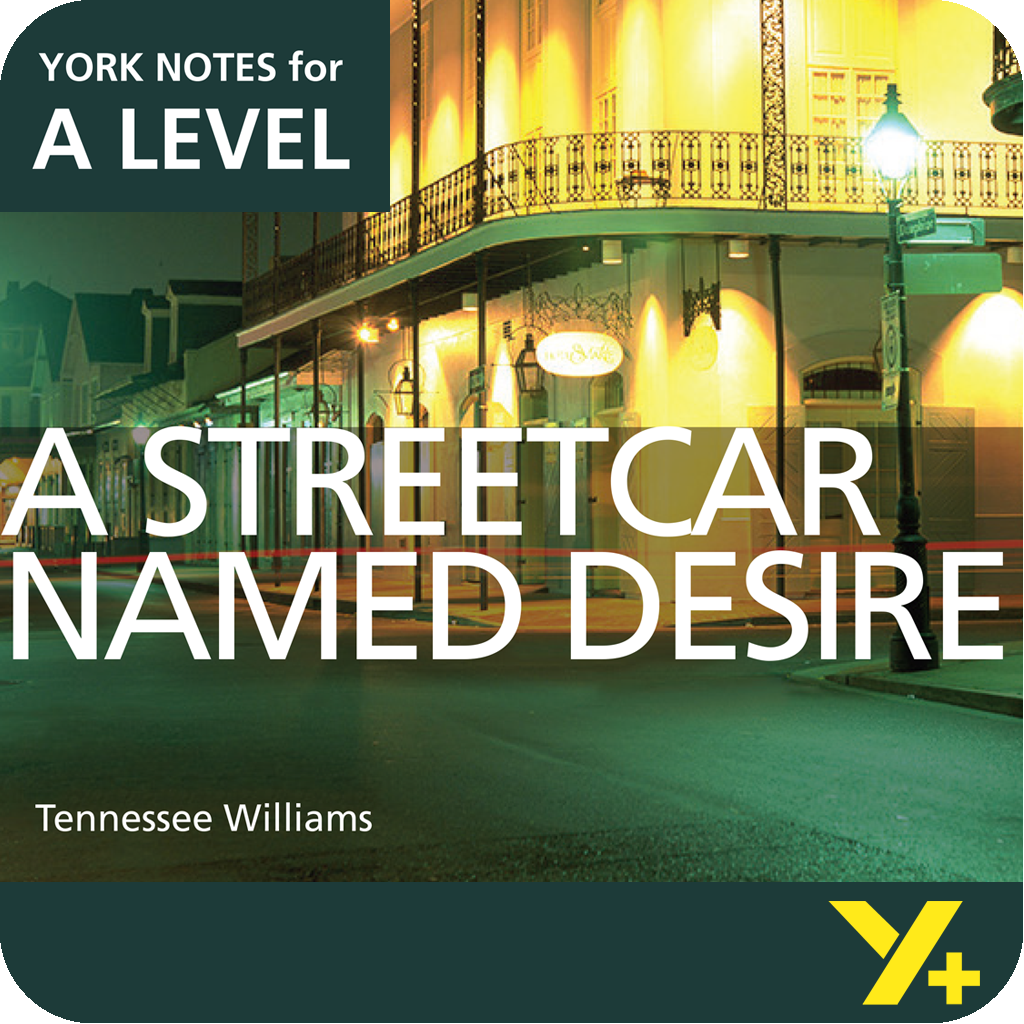Your Assessment
Read through the answer below and decide what level to give it. Use the Hints & Tips to help you make your assessment.
The importance of desire in the play, and the playwright’s mixed attitude towards it, is highlighted by the title. This is explained in the opening scene: Blanche travels on a New Orleans streetcar ‘named Desire’, then changes to one called Cemeteries, to reach her sister’s home. This implies that desire leads to death. Making the symbolism more obvious, Blanche tells Stella in Scene Four that the ‘streetcar’ of desire has led her to the Kowalski apartment: ‘Where I’m not wanted and where I’m ashamed to be’.
For Blanche, desire does prove to be both dangerous and destructive. Her husband’s homosexual desire led to his suicide, from which Blanche has never recovered: missing him and still feeling guilty, she hallucinates the polka music that was playing when she told him ‘You disgust me’, and the gunshot that followed. These are also heard by the audience. Ironically, her judgemental reaction to finding Allan with another man indirectly led her to a lifestyle for which she is also judged: her liaisons with strangers at a ‘second-class’ hotel, where, as Stanley ironically puts it, ‘even the management of the Flamingo was impressed by Dame Blanche’.
It is also desire that has led to Blanche losing her teaching job for having sex with a student: she is called ‘unfit for her position’. From a psychoanalytical viewpoint, she is perhaps trying to relive her relationship with Allan. We see this, too, in her kissing the young man in Scene Five. She knows she is meant to keep her ‘hands off children’, but she cannot resist.
Mitch is fascinated by Blanche’s personality, but beneath this is simple desire for her. When he discovers her past, he is disillusioned. When she is led away, he is very upset but does nothing to prevent it. Desire is often mixed up with other feelings. Mitch is fascinated by Blanche’s lively personality and imagination, but he also desires her sexually. He is, however, deeply disillusioned when he hears about her promiscuity. He no longer wants to marry her, even though he still wants sex with her.
As Mitch is a simple man of his time and class, and strongly influenced by Stanley, it is hardly surprising that he joins Stanley in condemning Blanche’s behaviour, saying that she is ‘not clean enough’ to have in the house with his mother. So Blanche is the victim of the male chauvinist double standards of the USA in 1947, and of men either idealising women or condemning them.
Williams portrays desire more positively in Stella. She loves Stanley passionately, confiding in Blanche that, when he comes home after being away, she cries ‘in his lap like a baby’. Moreover, desire leads to her becoming a mother. She has lowered her standards by falling in love with Stanley, but she seems content – even after he smashes the radio and hits her at the end of the poker night (Scene Three). She becomes cold and tight-lipped when listening to Blanche’s comments about Stanley and his fellow ‘apes’, and about how Stella has settled for this ‘sub-human’ existence and abandoned all hope of higher things such as ‘poetry and music’. When Stanley returns, she makes a point of embracing him in view of Blanche.
For Stanley, too, desire is mostly positive, linked with the ‘coloured lights’ that he associates with loving Stella. However, it is negative when he double betrays his wife by raping her sister. Stanley does seem to love Stella, and for him, sexual desire is bound up with that. He tells her that everything will be all right again when they can ‘get those coloured lights going’ and ‘make noise again’, after Blanche has gone. This is a big reason for his resenting Blanche – it interferes with his sex life. For Stanley, sexual desire is tied up with domination and ownership, like when he slaps Stella’s thigh at his poker night, like he owns her body. More destructively, we see this when he takes the opportunity to rape Blanche, asserting his final victory over her in the way that comes most naturally to him. It could be argued that Blanche allows this to happen, or that his dramatic line at the end of Scene Ten, ‘We’ve had this date with each other from the beginning!’, is an attempt to justify the rape by making it seem fated.
The most positive outcome of desire in the play is the baby – even though, oddly, there is little focus on it. Desire is also seen as positive in that for Stella and Stanley, and for Eunice and Steve, it leads to reconciliation after conflict. In this play, then, desire is a fact of life that leads to new life. It is the glue that holds marriages together, but it also drives people apart and even leads to death. Ultimately, it is both destructive and creative in equal measure.
